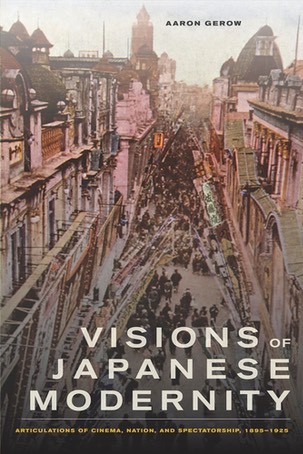
Visions of
Japanese Modernity: Articulations of Cinema, Nation, and Spectatorship,
1895-1925 (University of California Press, 2010).
After a long wait, my "magnum opus" is finally out. Here's the main blurb:
"Japan has done marvelous things with cinema, giving the world the likes of Kurosawa, Mizoguchi, and Ozu. But cinema did not arrive in Japan fully formed at the end of the nineteenth century, nor was it simply adopted into an ages-old culture. Aaron Gerow explores the processes by which film was defined, transformed, and adapted during its first three decades in Japan. He focuses in particular on how one trend in criticism, the Pure Film Movement, changed not only the way films were made, but also how they were conceived. Looking closely at the work of critics, theorists, intellectuals, benshi artists, educators, police, and censors, Gerow finds that this trend established a way of thinking about cinema that would reign in Japan for much of the twentieth century."
I was very fortunate that some people whom I really respect wrote some kind recommendations for the book:
"Visions of Japanese Modernity is the single best account of the
formation of Japanese cinema. Deftly drawing on film discourses,
regulations, and exhibition practices, it brilliantly brings into focus
one of the most exuberant and contested moments in the history of
cinema. It not only sets new standards for film history but also plants
the seeds for a counterhistory to cinema as such."--Thomas LaMarre,
author of The Anime Machine: A Media Theory of Animation
"In this landmark study, Aaron Gerow richly demonstrates the vibrancy of Japanese film culture as no book has done before. Visions of Japanese Modernity is centered on the contentious Pure Film Movement, and the
transformations it helped provoke in performance, screenwriting,
censorship, film style, and benshi oratory. With virtually no extant
films to work with, Gerow strategically turns to a multitude of other
sources, including fanzines, popular movie magazines, sociological
studies, government regulations, and impressive works of early film
theory. Rich in detail and lucidly argued, Visions of Modernity
provides a model for writing about filmmaking in its social, political
and aesthetic contexts."--Abé Mark Nornes, author of Cinema Babel: Translating Global Cinema
"Gerow
offers not only a benchmark in the study of Japanese cinema, but a
major contribution to world film history; a thoroughly researched and
complexly argued 'discursive' history of early Japanese cinema, that
avoids approaching it simply as an alternative to western cinema and
reveals the unique role cinema played in the formulation of modern
Japanese culture. Gerow makes clear the foundations of Japanese film
history in the silent era--and how it shaped the complex and exciting
national cinema that followed."--Tom Gunning, author of D.W. Griffith and the Origins of American Narrative Film: THE EARLY YEARS AT BIOGRAPH
"A formidable introduction, a demanding text that, although plumy with scholarship and academic nomenclature, helps the nonspecialist reader to situate his ideas, concur with, or reject the notions of other film historians. . . . A work of film connoisseurship, an effort to define film and the search for a discourse on modernity in the early formative years of Japanese cinema, this erudite work will also appeal to readers who wish to know more about the social and cultural conditions of the times."--Stephen Mansfield, The Japan Times
Ordering:
A Japanese version will be published by the University of Tokyo Press.
I also discussed the book and gave the table of contents on my blog. An excerpt from the book is available on my site on the Yale repository.